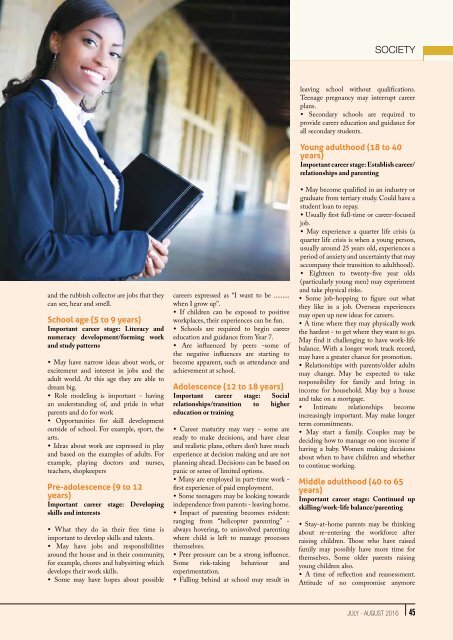The-Accountant-Jul-Aug-2016
Create successful ePaper yourself
Turn your PDF publications into a flip-book with our unique Google optimized e-Paper software.
SOCIETY<br />
and the rubbish collector are jobs that they<br />
can see, hear and smell.<br />
School age (5 to 9 years)<br />
Important career stage: Literacy and<br />
numeracy development/forming work<br />
and study patterns<br />
• May have narrow ideas about work, or<br />
excitement and interest in jobs and the<br />
adult world. At this age they are able to<br />
dream big.<br />
• Role modeling is important - having<br />
an understanding of, and pride in what<br />
parents and do for work<br />
• Opportunities for skill development<br />
outside of school. For example, sport, the<br />
arts.<br />
• Ideas about work are expressed in play<br />
and based on the examples of adults. For<br />
example, playing doctors and nurses,<br />
teachers, shopkeepers<br />
Pre-adolescence (9 to 12<br />
years)<br />
Important career stage: Developing<br />
skills and interests<br />
• What they do in their free time is<br />
important to develop skills and talents.<br />
• May have jobs and responsibilities<br />
around the house and in their community,<br />
for example, chores and babysitting which<br />
develops their work skills.<br />
• Some may have hopes about possible<br />
careers expressed as “I want to be .........<br />
when I grow up”.<br />
• If children can be exposed to positive<br />
workplaces, their experiences can be fun.<br />
• Schools are required to begin career<br />
education and guidance from Year 7.<br />
• Are influenced by peers -some of<br />
the negative influences are starting to<br />
become apparent, such as attendance and<br />
achievement at school.<br />
Adolescence (12 to 18 years)<br />
Important career stage: Social<br />
relationships/transition to higher<br />
education or training<br />
• Career maturity may vary - some are<br />
ready to make decisions, and have clear<br />
and realistic plans, others don’t have much<br />
experience at decision making and are not<br />
planning ahead. Decisions can be based on<br />
panic or sense of limited options.<br />
• Many are employed in part-time work -<br />
first experience of paid employment.<br />
• Some teenagers may be looking towards<br />
independence from parents - leaving home.<br />
• Impact of parenting becomes evident:<br />
ranging from “helicopter parenting” -<br />
always hovering, to uninvolved parenting<br />
where child is left to manage processes<br />
themselves.<br />
• Peer pressure can be a strong influence.<br />
Some risk-taking behaviour and<br />
experimentation.<br />
• Falling behind at school may result in<br />
leaving school without qualifications.<br />
Teenage pregnancy may interrupt career<br />
plans.<br />
• Secondary schools are required to<br />
provide career education and guidance for<br />
all secondary students.<br />
Young adulthood (18 to 40<br />
years)<br />
Important career stage: Establish career/<br />
relationships and parenting<br />
• May become qualified in an industry or<br />
graduate from tertiary study. Could have a<br />
student loan to repay.<br />
• Usually first full-time or career-focused<br />
job.<br />
• May experience a quarter life crisis (a<br />
quarter life crisis is when a young person,<br />
usually around 25 years old, experiences a<br />
period of anxiety and uncertainty that may<br />
accompany their transition to adulthood).<br />
• Eighteen to twenty-five year olds<br />
(particularly young men) may experiment<br />
and take physical risks.<br />
• Some job-hopping to figure out what<br />
they like in a job. Overseas experiences<br />
may open up new ideas for careers.<br />
• A time where they may physically work<br />
the hardest - to get where they want to go.<br />
May find it challenging to have work-life<br />
balance. With a longer work track record,<br />
may have a greater chance for promotion.<br />
• Relationships with parents/older adults<br />
may change. May be expected to take<br />
responsibility for family and bring in<br />
income for household. May buy a house<br />
and take on a mortgage.<br />
• Intimate relationships become<br />
increasingly important. May make longer<br />
term commitments.<br />
• May start a family. Couples may be<br />
deciding how to manage on one income if<br />
having a baby. Women making decisions<br />
about when to have children and whether<br />
to continue working.<br />
Middle adulthood (40 to 65<br />
years)<br />
Important career stage: Continued up<br />
skilling/work-life balance/parenting<br />
• Stay-at-home parents may be thinking<br />
about re-entering the workforce after<br />
raising children. Those who have raised<br />
family may possibly have more time for<br />
themselves. Some older parents raising<br />
young children also.<br />
• A time of reflection and reassessment.<br />
Attitude of no compromise anymore<br />
JULY - AUGUST <strong>2016</strong> 45

















